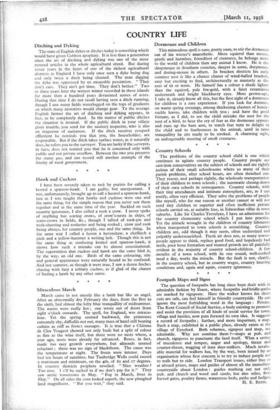COUNTRY LIFE
Ditching and Dyking The state of English dykes or ditches today is something which would have given Cobbett apoplexy. It is less than a generation since the art of ditching and dyking was one of the most revered articles in the whole agricultural creed. But during seven years in the heart of one of the richest agricultural districts in England I have only once seen a dyke being dug and only twice a ditch being cleaned. The man digging the dyke was oppressed by an excusable pessimism. " They don't care. They ain't got time. They don't bother." Two or three years later the wettest winter recorded in these islands for more than a hundred years devastated scores of acres. During that time I do not recall having seen a ditch running, though I saw many fields waterlogged on the tops of gradients on which many motorists would change gear. To the average English farmer the art of ditching and dyking appears, in fact, to be completely dead. In the matter of public ditches the situation is ironical. If the public ditch in your village gives trouble, you send for the sanitary inspector, who is also an inspector of nuisances. If the ditch receives cesspool effiuvient he reminds you that you, the householder, are responsible. But if the ditch takes surface water, as it naturally does, he refers you to the surveyor. You are lucky if the surveyor, in turn, does not remind you that he is concerned only with public and not private overflow. Between the two you preserve the status quo, and can record still another example of the fatuity of rural government.










































 Previous page
Previous page